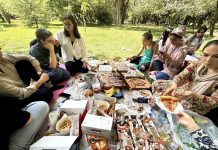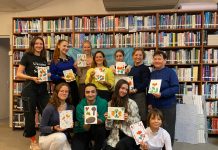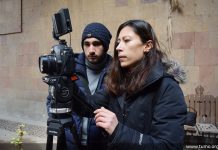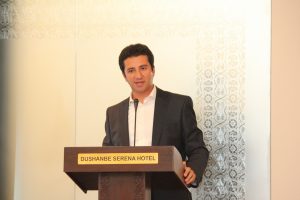 ‘Crystallize your thoughts about what you are trying to achieve and never lose faith in yourself. Make sure to stay in touch with other alumni as networks are the most valuable assets a professional can have,’ Jamshed advises his fellow FLEX alumni.
‘Crystallize your thoughts about what you are trying to achieve and never lose faith in yourself. Make sure to stay in touch with other alumni as networks are the most valuable assets a professional can have,’ Jamshed advises his fellow FLEX alumni.
Jamshed Rahmonberdiev ‘95
Dushanbe, Tajikistan / Oceanside California
Education: Bachelor of Science and Master of Science in International Economic Relations from Tajik National University
When he came back to Tajikistan after his FLEX year, Jamshed Rahmonberdiev ’95 soon realized what he wanted to achieve – he was eager to become part of the change, which was happening in his country. He has succeeded in it; for the last five years he has been working for the European Bank for Reconstruction and Development (EBRD), a large financial investor that helps countries establish open market economies, while promoting sustainability and energy efficiency. Working in an EBRD country team as a banker, Jamshed relies on his FLEX experience: ‘As a FLEX alumnus I have an advantage of knowing two completely different worlds and I have always thought of it as a blessing. I understand how things work in the West, but I’m also familiar with the local context and its peculiarities. This makes the conversation for both sides much easier and the result more tangible’.
At EBRD Jamshed is responsible for the project cycle and primarily works with power and energy and transportation teams. At the moment they are running a project with a local electric utility firm. One of the biggest challenges of this project is the outdated infrastructure for power distribution and metering. Therefore, together with the European Investment Bank, they are financing the installation of electronic meters and the deployment of billing software. Jamshed considers the fact that stable enterprises haven’t transformed themselves into service delivery companies, which prioritize customer service and efficiency, a major drawback of the energy sector in Tajikistan. ‘Power companies often focus on maintaining infrastructure and fail to fulfill their other responsibilities. At EBRD we are trying to help companies tackle these problems and raise finances in order to provide high-quality service’.
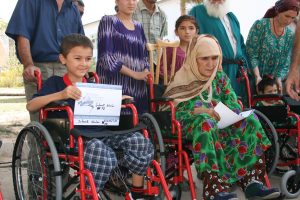 Besides EBRD, Jamshed is also an active member and one of the founders of the Rotary Club of Dushanbe where he has previously served as president. Over the last 8 years the club conducted a variety of significant projects, with its flagship one being the distribution of wheelchairs to local people, a joint effort with the Wheelchair Foundation and a number of Rotary clubs in the U.S. and Canada. As a result of the project, over 200 wheelchairs were delivered to people in Tajikistan.
Besides EBRD, Jamshed is also an active member and one of the founders of the Rotary Club of Dushanbe where he has previously served as president. Over the last 8 years the club conducted a variety of significant projects, with its flagship one being the distribution of wheelchairs to local people, a joint effort with the Wheelchair Foundation and a number of Rotary clubs in the U.S. and Canada. As a result of the project, over 200 wheelchairs were delivered to people in Tajikistan.
Since the Wheelchair Foundation’s required that each wheelchair should be presented personally, Jamshed and other club members distributed them to villages and towns all over the country: ‘It was quite difficult to do, emotionally. Some people who were given a chair had never been outside and had never breathed fresh air. The infrastructure in Tajikistan is not designed for people with disabilities and some had been excluded from most forms of social activity all of their life. One story particularly touched Jamshed. ‘When we were presenting a wheelchair to a 9-year-old boy, his younger sister got excited and started dancing around it; she kept touching the wheelchair and saying to her brother: ‘Now you will be able to see everything with your own eyes. I will roll you around and we will travel everywhere together.’
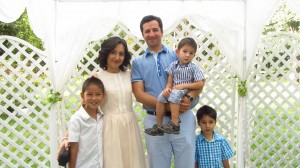 Occasionally Rotary Club work raises the expectations of local communities, which see their projects as free services from abroad. This can complicate the implementation of projects and damage long-term development. ‘Once we made an agreement with a village that they would dig out trenches and we would then fill them with pumps. However, when we arrived at the location the leader of the community told us that since we were a rich international organisation we had to hire labourers to do the work for them. After a series of long and quite tough discussions they agreed to cooperate with us, but that reaction was something we had never expected to receive and needed to take into account in the future,’ Jamshed describes.
Occasionally Rotary Club work raises the expectations of local communities, which see their projects as free services from abroad. This can complicate the implementation of projects and damage long-term development. ‘Once we made an agreement with a village that they would dig out trenches and we would then fill them with pumps. However, when we arrived at the location the leader of the community told us that since we were a rich international organisation we had to hire labourers to do the work for them. After a series of long and quite tough discussions they agreed to cooperate with us, but that reaction was something we had never expected to receive and needed to take into account in the future,’ Jamshed describes.
‘In general I feel that I have been very lucky so far, but I also have a lot of responsibility on my shoulders because of it. I am the oldest member in my family now and whatever I do, I can’t afford to give up. The aim of my life is to serve my community and my family,’ Jamshed says.
Article written by Tatyana Movshevich


